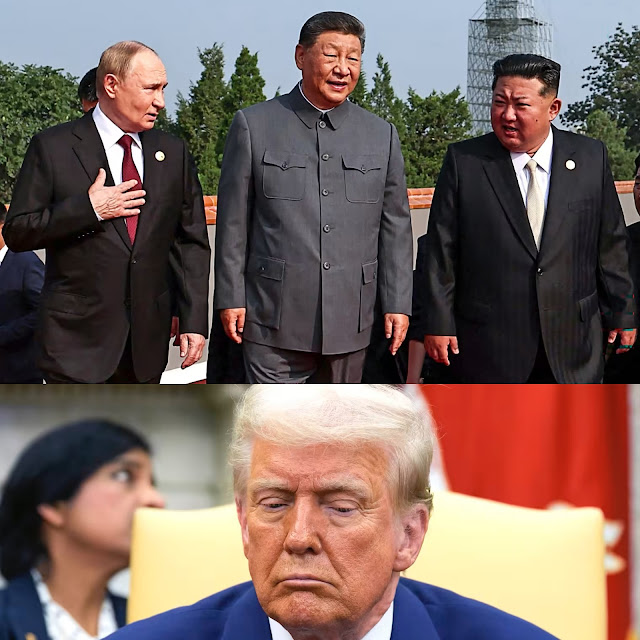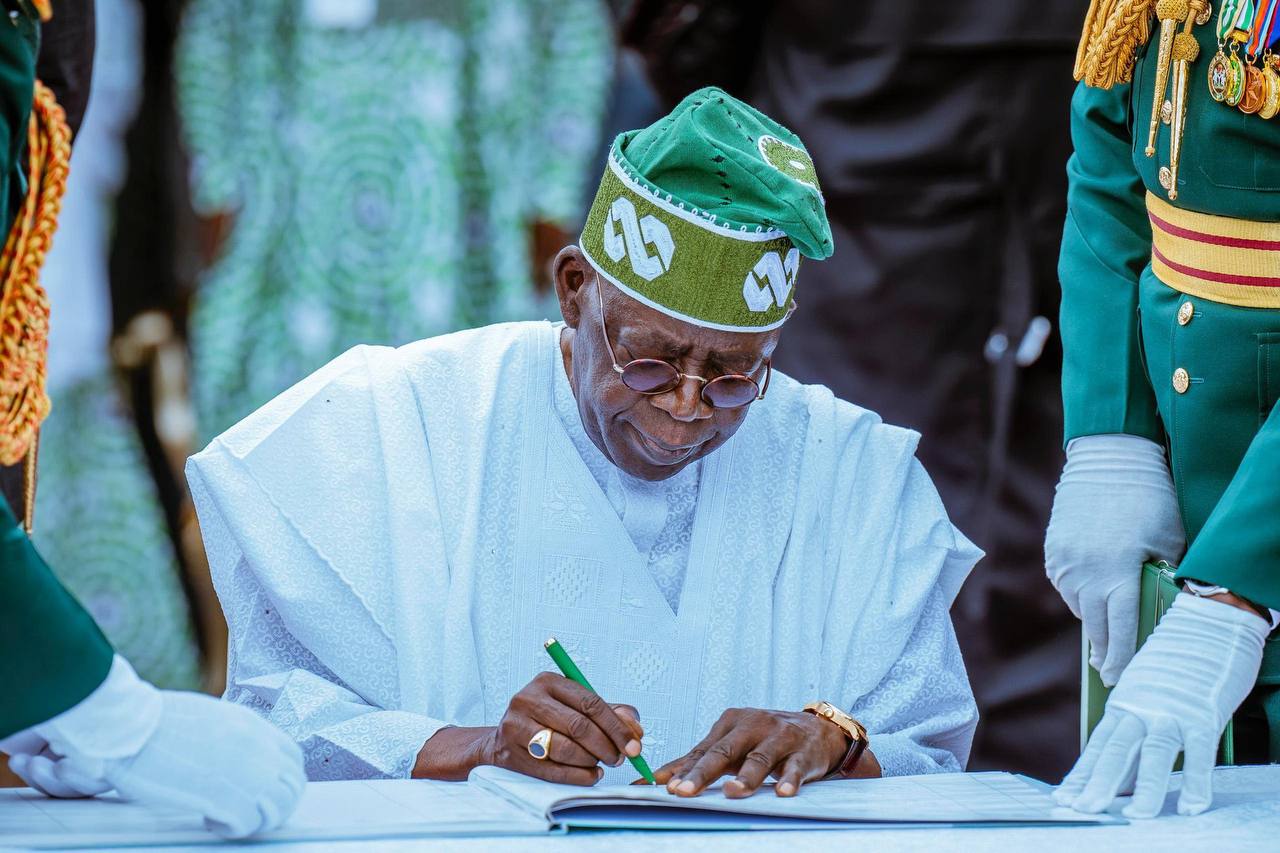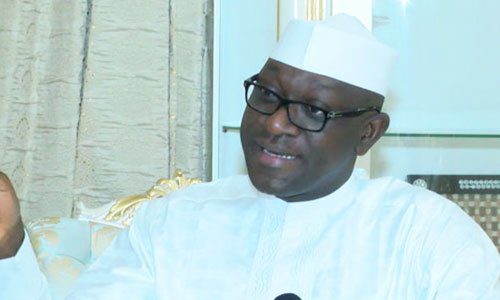On September 3, 2025, former U.S. President Donald J. Trump made headlines with a bold and provocative statement, accusing the leaders of Russia, China, and North Korea of orchestrating a coordinated effort to undermine the United States. Speaking at a public event, Trump claimed that Presidents Vladimir Putin, Xi Jinping, and Kim Jong-un were working together to weaken American influence on the global stage. These remarks, reported by various media outlets, including Linda Ikeji’s Blog, have sparked widespread discussion, reigniting debates about U.S. foreign policy, global alliances, and the challenges facing American leadership in an increasingly multipolar world.
This article delves into the details of Trump’s accusations, explores the geopolitical context surrounding these claims, and examines the implications for U.S. national security, international relations, and global stability. By analyzing the historical relationships between the U.S. and these three nations, the current state of their interactions, and the broader strategic dynamics at play, we aim to provide a comprehensive understanding of Trump’s statements and their significance in today’s complex global landscape.
The Context of Trump’s Remarks
Donald Trump, the 45th President of the United States and a prominent figure in American politics, has long been known for his outspoken and often polarizing rhetoric. Since leaving office in January 2021, Trump has remained a central figure in U.S. political discourse, frequently commenting on domestic and international issues. His latest claims, made during a public appearance in early September 2025, reflect his ongoing concerns about America’s position in the world and the intentions of its geopolitical rivals.
According to reports, Trump alleged that Russia, China, and North Korea are engaged in a deliberate conspiracy to weaken the United States economically, militarily, and politically. He suggested that these nations are collaborating to challenge U.S. dominance, citing their growing partnerships in trade, military cooperation, and diplomatic efforts. Trump’s remarks come at a time of heightened tensions between the U.S. and these countries, with ongoing disputes over issues such as trade imbalances, cybersecurity threats, nuclear proliferation, and regional conflicts.
While Trump did not provide specific evidence to support his claims of a formal conspiracy, his statements resonate with a broader narrative that has gained traction in some circles: the idea that authoritarian regimes are increasingly aligning to counter Western influence, particularly that of the United States. To understand the validity and implications of Trump’s accusations, it is essential to examine the relationships between Russia, China, and North Korea, as well as their interactions with the U.S.
Historical Context: The U.S. and Its Geopolitical Rivals
To fully grasp the significance of Trump’s claims, it is necessary to explore the historical relationships between the United States and the three nations he mentioned: Russia, China, and North Korea. Each of these countries has a complex history with the U.S., marked by periods of cooperation, competition, and outright hostility.
The United States and Russia
The relationship between the United States and Russia has been one of the defining dynamics of global politics since the end of World War II. During the Cold War, the U.S. and the Soviet Union were locked in an ideological and military rivalry that shaped international relations for decades. The collapse of the Soviet Union in 1991 marked a temporary thaw in tensions, but the emergence of modern Russia under Vladimir Putin has led to renewed competition.
In recent years, U.S.-Russia relations have been strained by a series of events, including Russia’s annexation of Crimea in 2014, its alleged interference in the 2016 U.S. presidential election, and its ongoing war in Ukraine, which began in 2022. The U.S. has responded with sanctions, military aid to Ukraine, and efforts to strengthen NATO, while Russia has deepened its partnerships with other nations, including China and North Korea, to counter Western influence.
Trump’s presidency (2017–2021) was notable for its unconventional approach to Russia. While Trump expressed admiration for Putin and sought to improve bilateral ties, his administration imposed sanctions on Russian entities and individuals, expelled diplomats, and provided military support to Ukraine. Critics argued that Trump’s rhetoric was overly conciliatory toward Russia, while supporters claimed he was pursuing a pragmatic strategy to reduce tensions. Trump’s latest accusations suggest a shift in tone, portraying Russia as part of a coordinated effort to undermine the U.S.
The United States and China
The U.S.-China relationship is arguably the most consequential bilateral relationship in the world today. Over the past few decades, China’s rapid economic growth and military modernization have transformed it into a global superpower, challenging U.S. dominance in areas such as trade, technology, and regional influence in the Indo-Pacific. While the two countries have cooperated on issues like climate change and global trade, they are increasingly at odds over issues such as tariffs, intellectual property theft, human rights, and China’s territorial claims in the South China Sea.
During his presidency, Trump adopted a hardline stance toward China, launching a trade war that imposed tariffs on hundreds of billions of dollars’ worth of Chinese goods. He also accused China of unfair trade practices, currency manipulation, and responsibility for the global spread of COVID-19. These policies resonated with many Americans who felt that China’s rise posed a threat to U.S. economic and strategic interests. However, critics argued that Trump’s approach was erratic and failed to achieve lasting results, as China continued to expand its global influence.
Since leaving office, Trump has maintained his critical stance toward China, frequently warning about its growing power and influence. His accusation of a conspiracy involving China aligns with his broader narrative of a “China threat” and reflects concerns shared by many U.S. policymakers about Beijing’s ambitions.
The United States and North Korea
The U.S.-North Korea relationship has been defined by decades of hostility, primarily due to North Korea’s nuclear weapons program and its provocative actions on the Korean Peninsula. The Korean War (1950–1953) left the peninsula divided, with the U.S. supporting South Korea and North Korea aligning with communist powers like China and the Soviet Union. Since then, North Korea’s pursuit of nuclear weapons has been a major source of tension, leading to multiple rounds of sanctions, diplomatic standoffs, and military posturing.
Trump’s presidency marked a historic shift in U.S.-North Korea relations, as he became the first sitting U.S. president to meet with North Korean leader Kim Jong-un. Their summits in Singapore (2018), Hanoi (2019), and the Korean Demilitarized Zone (2019) raised hopes for a diplomatic breakthrough, but negotiations ultimately stalled over disagreements about denuclearization and sanctions relief. While Trump touted his personal rapport with Kim, critics argued that the summits legitimized North Korea’s regime without achieving concrete results.
Trump’s recent accusation that North Korea is conspiring with Russia and China suggests a departure from his earlier efforts to engage Kim diplomatically. It also reflects ongoing concerns about North Korea’s growing ties with other authoritarian regimes, particularly in the context of its nuclear ambitions and ballistic missile tests.
The Alleged Conspiracy: Fact or Fiction?
Trump’s claim that Russia, China, and North Korea are conspiring against the United States is a serious accusation that warrants careful scrutiny. While the term “conspiracy” implies a secretive, coordinated effort, it is worth examining whether there is evidence of such collaboration and what form it might take.
Growing Ties Between Russia, China, and North Korea
In recent years, there has been evidence of deepening ties between Russia, China, and North Korea, driven by shared interests in countering U.S. influence and resisting Western sanctions. These relationships are not necessarily indicative of a formal conspiracy, but they do reflect a convergence of strategic goals.
Russia-China Partnership
The relationship between Russia and China has grown significantly stronger in recent years, particularly since the start of the Ukraine conflict in 2022. Facing Western sanctions, Russia has turned to China as a key economic partner, with bilateral trade reaching record levels. The two countries have also conducted joint military exercises, cooperated on energy projects, and aligned their positions on issues such as U.N. sanctions and regional security.
For example, the “no-limits” partnership declared by Putin and Xi in February 2022, shortly before Russia’s invasion of Ukraine, signaled a deepening strategic alignment. While this partnership is not explicitly aimed at the U.S., both countries share an interest in challenging the U.S.-led international order and promoting a multipolar world.
Russia-North Korea Cooperation
Russia’s relationship with North Korea has also strengthened, particularly in the context of the Ukraine war. Reports indicate that North Korea has supplied Russia with artillery shells, missiles, and other military equipment, in exchange for economic support and technological assistance. This cooperation has raised concerns in the U.S. and its allies, as it suggests that Russia is helping North Korea evade international sanctions.
In June 2024, Putin and Kim signed a mutual defense pact during a summit in Pyongyang, further solidifying their partnership. This agreement, which includes a commitment to provide military assistance in the event of an attack, has been viewed as a direct challenge to U.S. and South Korean interests in the region.
China-North Korea Relations
China has long been North Korea’s primary ally and economic lifeline, providing food, fuel, and diplomatic support. While the relationship has experienced ups and downs, particularly over North Korea’s nuclear provocations, China has consistently opposed harsh U.N. sanctions and maintained trade ties with Pyongyang. In recent years, China has worked with Russia to block U.S.-led efforts to impose new sanctions on North Korea at the U.N. Security Council.
The alignment between China and North Korea is driven by shared concerns about U.S. military presence in the region, particularly in South Korea and Japan. Both countries also seek to counterbalance U.S. influence in Asia and maintain stability on the Korean Peninsula to avoid a refugee crisis or U.S.-backed unification.
Possible Forms of Cooperation
While there is no definitive evidence of a formal “conspiracy” as Trump described, there are several areas where Russia, China, and North Korea could be collaborating to challenge U.S. interests:
Economic Coordination: Russia and China have worked to reduce their reliance on the U.S. dollar by promoting trade in their own currencies and developing alternative financial systems. North Korea, heavily sanctioned, benefits from economic support from both countries, which helps it evade U.S.-led restrictions.
Military Cooperation: Joint military exercises, arms transfers, and technological exchanges between these nations could enhance their collective capabilities. For example, North Korea’s missile technology, which some analysts believe has been aided by Russian expertise, poses a growing threat to the U.S. and its allies.
Cyber Warfare: All three countries have been accused of conducting cyberattacks against the U.S., ranging from intellectual property theft to election interference. While there is no public evidence of coordinated cyberattacks, their shared interest in disrupting U.S. systems could lead to informal collaboration.
Diplomatic Alignment: At the U.N. and other international forums, Russia and China frequently align to block U.S. initiatives, such as sanctions on North Korea or resolutions condemning human rights abuses. This diplomatic coordination strengthens their collective influence.
Evaluating Trump’s Claims
Trump’s assertion of a conspiracy may overstate the level of coordination between Russia, China, and North Korea. While these countries share strategic interests and have deepened their ties, their relationships are also marked by mutual distrust and competing priorities. For example, China has at times expressed frustration with North Korea’s provocative actions, while Russia and China compete for influence in Central Asia and other regions.
However, Trump’s remarks tap into a broader truth: the growing alignment of authoritarian regimes poses a challenge to U.S. leadership. Whether or not there is a formal conspiracy, the combined actions of Russia, China, and North Korea—through economic partnerships, military cooperation, and diplomatic maneuvering—create a complex and evolving threat to U.S. interests.
Implications for U.S. Policy
Trump’s accusations, whether substantiated or not, highlight the need for a coherent U.S. strategy to address the challenges posed by Russia, China, and North Korea. The Biden administration, which has been in office since January 2021, has prioritized countering these nations through a combination of diplomacy, economic measures, and military deterrence. However, Trump’s remarks underscore the ongoing debate about how best to manage these relationships.
Strengthening Alliances
One of the most effective ways for the U.S. to counter the influence of Russia, China, and North Korea is by strengthening its alliances. The U.S. has a network of allies in Europe (through NATO) and Asia (through partnerships with Japan, South Korea, and Australia), which provide a counterbalance to authoritarian regimes. The Biden administration has worked to repair alliances strained during Trump’s presidency, but challenges remain, particularly in coordinating responses to hybrid threats like cyberattacks and disinformation campaigns.
Economic Competition
Economically, the U.S. must address its vulnerabilities, such as reliance on Chinese manufacturing and supply chains. The Biden administration has continued some of Trump’s policies, such as restricting exports of sensitive technology to China and investing in domestic industries. However, a long-term strategy requires greater investment in innovation, infrastructure, and education to maintain U.S. competitiveness.
Military Preparedness
Militarily, the U.S. faces the challenge of deterring aggression from multiple fronts. Russia’s actions in Ukraine, China’s assertiveness in the Indo-Pacific, and North Korea’s nuclear ambitions require a robust and flexible defense posture. The U.S. has increased its military presence in the Indo-Pacific and provided significant aid to Ukraine, but sustaining these efforts will require bipartisan support and careful resource allocation.
Diplomatic Engagement
Diplomatically, the U.S. must balance confrontation with engagement. While sanctions and pressure are important tools, dialogue with adversaries can help manage tensions and prevent escalation. Trump’s summits with Kim Jong-un, while controversial, demonstrated the potential for diplomacy to open new channels of communication. The Biden administration has pursued a more cautious approach, but opportunities for engagement with Russia, China, and North Korea should not be dismissed outright.
Public and Political Reactions
Trump’s accusations have elicited a range of reactions from political leaders, analysts, and the public. Supporters of Trump argue that his remarks highlight a real and underappreciated threat, accusing the Biden administration of being too soft on America’s adversaries. Critics, however, contend that Trump’s claims are exaggerated and lack evidence, accusing him of stoking fear for political gain.
On social media platforms like X, users have expressed a mix of support and skepticism. Some posts echo Trump’s concerns, pointing to recent developments like the Russia-North Korea defense pact as evidence of a growing axis of authoritarian regimes. Others dismiss the claims as political rhetoric, arguing that Trump is attempting to rally his base ahead of future elections.
The Biden administration has not directly responded to Trump’s accusations, but officials have consistently emphasized the importance of countering threats from Russia, China, and North Korea through a combination of deterrence, alliances, and diplomacy. In recent statements, Secretary of State Antony Blinken and National Security Advisor Jake Sullivan have highlighted the need for a united international response to challenges posed by these nations.
Broader Geopolitical Implications
Trump’s remarks come at a time of significant global uncertainty. The war in Ukraine continues to reshape European security, while tensions in the Indo-Pacific, particularly over Taiwan, raise the specter of conflict between the U.S. and China. North Korea’s ongoing missile tests and nuclear ambitions further complicate the security environment.
The growing alignment of Russia, China, and North Korea, even if not a formal conspiracy, poses a challenge to the U.S.-led international order. These countries are increasingly working together to promote their vision of a multipolar world, one in which U.S. influence is diminished. This shift has implications for global trade, security, and governance, as well as for the future of democracy and human rights.
At the same time, the U.S. faces domestic challenges that complicate its ability to respond effectively. Political polarization, economic inequality, and debates over foreign policy priorities have made it harder to forge a unified approach to global challenges. Trump’s accusations, while controversial, reflect a broader anxiety about America’s role in the world and its ability to navigate an increasingly complex geopolitical landscape.
Conclusion
Former President Donald Trump’s claim that the leaders of Russia, China, and North Korea are conspiring against the United States is a provocative assertion that has sparked debate about the nature of global threats and the future of U.S. foreign policy. While there is no conclusive evidence of a formal conspiracy, the growing ties between these nations—through economic partnerships, military cooperation, and diplomatic alignment—suggest a convergence of interests that challenges U.S. dominance.
To address these challenges, the U.S. must strengthen its alliances, invest in its economic and military capabilities, and pursue a balanced approach to diplomacy. Trump’s remarks, whether grounded in fact or rhetoric, serve as a reminder of the complex and evolving nature of global competition. As the world becomes more interconnected and multipolar, the United States will need to adapt to new realities while maintaining its commitment to its values and interests.






